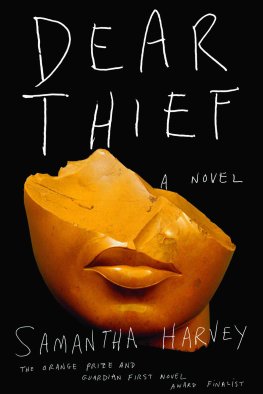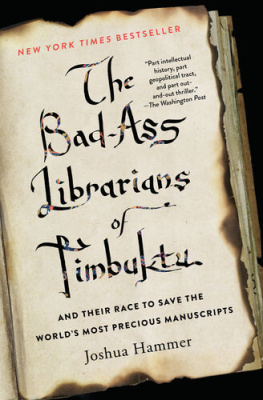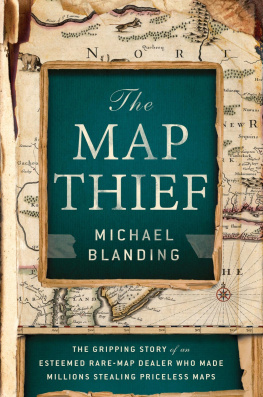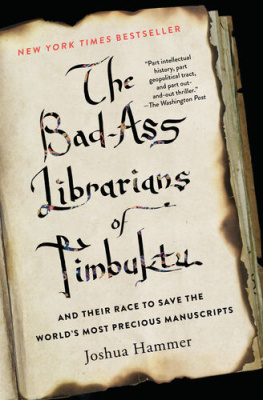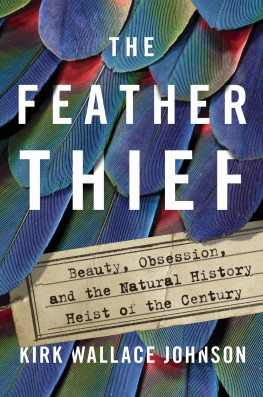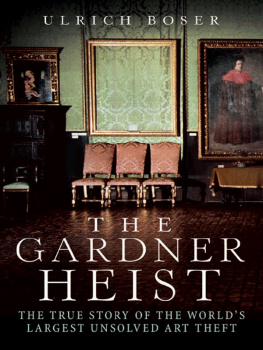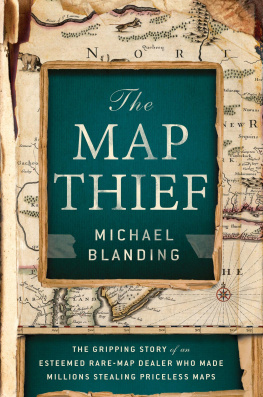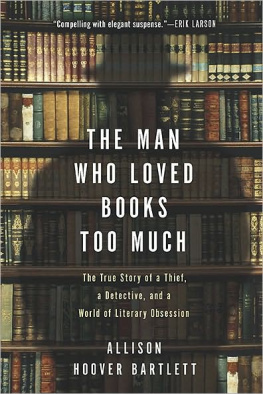RIVERHEAD BOOKS
a member of Penguin Group (USA) Inc. New York 2009


RIVERHEAD BOOKS
Published by the Penguin Group
Copyright 2009 by Allison Hoover Bartlett
All rights reserved.
For John, Julian, and Sonja
For him that stealeth, or borroweth and returneth not, this book from its owner . . . let him be struck with palsy, & all his members blasted. . . . Let bookworms gnaw his entrails in token of the Worm that dieth not, & when at last he goeth to his final punishment, let the flames of Hell consume him forever.
Anathema in a medieval manuscript from the Monastery of San Pedro in Barcelona
I have known men to hazard their fortunes, go long journeys halfway about the world, forget friendships, even lie, cheat, and steal, all for the gain of a book.
A. S. W. Rosenbach, twentieth-century book dealer
Prologue
At one end of my desk sits a nearly four-hundred-yearold book cloaked in a tan linen sack and a good deal of mystery. My friend Malcolm came across the book while carrying out the sad task of sorting through his brothers belongings after he committed suicide. On the sack was a handwritten note that began, To whom it may concern, and went on to explain that several years earlier, a friend had withdrawn the book from a college library where she worked and had accidentally taken it with her when she moved away. He wrote that she had wanted the book to be returned to the library anonymously, but that he hadnt had time to do so. Gingerly, Malcolm lifted the large, heavy tome with gleaming brass clasps from its sack. Isnt it beautiful? he said as he handed it to me. My first thought was: Yes, beautiful. My second: Its stolen.
I woke the next morning with the book in my head. Was the story in the note true? If not, where had the book come from? I could see that it was written in German, with a sprinkling of Latin, but what was it about? Was it valuable? Malcolm agreed to let me borrow it for a while. With the help of a German-speaking friend, a librarian, and a rare book dealer, I learned that it was a Krutterbuch (plant book1) of botanical medicine, by Hieronymus Bock, a botanist and physician. After book burnings in the Middle Ages, knowledge of traditional medicine had been lost, so at the time of the Krutterbuchs publication, in 1630, the book was a way to return to the old ways of healing, revolutionary for its time.2
The Krutterbuch weighs in at twelve pounds, and its cover, oak boards clad in pigskin,3 is slick but textured with embossed concentric patterns of flowers and leaves and curlicues that have taken on dark shading from the hands of those who have held it. I brought it to San Francisco rare book dealer John Windle, who told me that if you had ordered a copy of a Krutterbuch in the 1600s, you would have paid an extra fee to have the illustrations painted, which the owner of this copy did. The colors, mostly shades of olive or silvery green, mustard yellow, and wine red, were applied sloppily, which Windle informed me is a mark of authenticity; if you come across a meticulously hand-painted copy, theres a good chance it was executed by a booksellers assistant sometime in the past century in an effort to hike up the books value.4 To open the Krutterbuch, you have to squeeze it with two hands, thereby releasing the etched brass clasps shaped like Egyptian columns, flared at the top like regal palm trees. The pages, when turned, make a muffled crack, not unlike the sound of a flag on a windy afternoon, and turning them releases a dry, woody smell, a combination of must and sweetness that I associate with my grandparents old books. I always link the aroma of an old book to whatever era it was written in, as though its fragrance had emerged directly from the setting of the story. In the case of the Krutterbuch, this scent had traveled a long way in time and space, coming to me from Renaissance Germany. When I run my hand over the pages, I feel subtle waves, presumably warping from moisture, but none of its pages are torn. The blank endpaper is missing, but I learned that this is not unusual. Paper was expensive in the 1600s, and a blank page in a book could be cut out and used as stationery, or for wrapping fish,5 or for some other more useful purpose than sitting blankly at the front of a book. When I asked Windle about the books value, he said that because it was in fairly good shape it was worth $3,000 to $5,000. I was pleasantly surprised, although since the book was not mine, I had no rational reason for feeling such satisfaction.
Going through the book with a German-speaking friend and her mother (who was more familiar with its archaic lettering), we found remedies for all sorts of physical and mental maladies, from asthma to schizophrenia, as well as minor ailments.6 On page 50, for example, for a bad smell in the armpit, a long list of ingredients is recommended: pine needles, narcissus bulbs, bay leaf, almonds, hazelnut, chestnut, oak, linden, and birch, although it doesnt indicate how, exactly, they are to be used. Dried cherries help with kidney stones and worms. Dried figs with almonds are recommended for epilepsy. My favorite remedy, though, is for low spirits. Often we are missing the right kind of happiness, and if we dont have any wine yet, we will be very content when we do get wine.
Text from the reverse sides of pages in the Krutterbuch bleeds through in a ghostly way, making it seem that what exists on these pages might at any moment blend together or fade away entirely. But in 375 years it hasnt. The Krutterbuch remains much the same as when it was bound. That it hasnt lost its fullness, its ability to resist against the clasps, is one of its most awe-inspiring qualities. It seems a stubborn, righteous thing that has lasted all these years, and it took me some time to come to the realization that in turning its pages, I probably wouldnt harm it.
I had learned a lot about the book, but still had no clue where it was from. I searched the Internet for information about stolen rare books, but while nothing turned up about the Krutterbucheven the librarian from the library mentioned in the note said that they had no record of itI stumbled upon something even more intriguing: story after riveting story of theft. Some had occurred weeks or months before, others years ago, in Copenhagen, Kentucky, Cambridge. 7 They involved thieves who were scholars, thieves who were clergymen, thieves who stole for profit, and those whom I found most compelling: smitten thieves who stole purely for the love of books. In several accounts, I came across references to Ken Sanders, a rare book dealer who had become an amateur detective. For three years Sanders had been driven to catch John Gilkey, a man who had become the most successful book thief in recent years. When I contacted Sanders, he said that he had helped put Gilkey behind bars a couple of years earlier, but that he was now free. He had no idea where Gilkey was and doubted that I would have any luck finding him. He also believed that Gilkey was a man who stole out of a love of books. This was the sort of thief whose motivation I might understand. I had to find him.
The more I learned about collectors, the more I began to regard myself as a collector, not of books, but of pieces of this story, and like the people I met who become increasingly rabid and determined as they draw near to completing their book collections, the more information I came across, the more I craved. I learned about vellum and buckram, errata slips and deckled edges. I read about famous inscriptions and forgeries and discoveries. My notebooks grew in number and sat in piles thicker than ten
Next page

